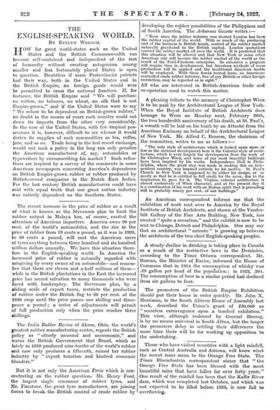THE
ENGLISH-SPEAKING WORLD.
BY EVELYN WRENCH. HOW far great world-states such as the United States and the British Commonwealth can become self-contained and independent of the rest of humanity without creating antagonism among smaller and less fortunately placed States is open to question. Doubtless if some Protectionist patriots had their way, both in the United States and in the British Empire, no foreign goods would ever be permitted to cross the national frontiers. If, for instance, the British Empire said " We will purchase no cotton, no tobacco, no wheat, no silk that is not Empire-grown," and if the United States were to say " We refuse to be dependent on British-grown rubber," no doubt in the course of years each country could cut down its imports from the other very considerably. In the case of the United States, with few tropical pos- sessions it is, however, difficult to see whence it would derive its supplies of such commodities as tea, coffee, jute, and .so on. Trade being in the last resort exchange, would not such a policy in the long run only penalize the American manufacturer of; say, automobiles or typewriters by circumscribing his market ? Such reflec- tions are inspired by a survey of the comments in some American newspapers concerning America's dependence on British. Empire-grown rubber or rubber produced by British-owned companies in the Dutch East Indies. For the last century British manufacturers could have said with equal truth that our great cotton industry was entirely dependent on the Southern States.










































 Previous page
Previous page